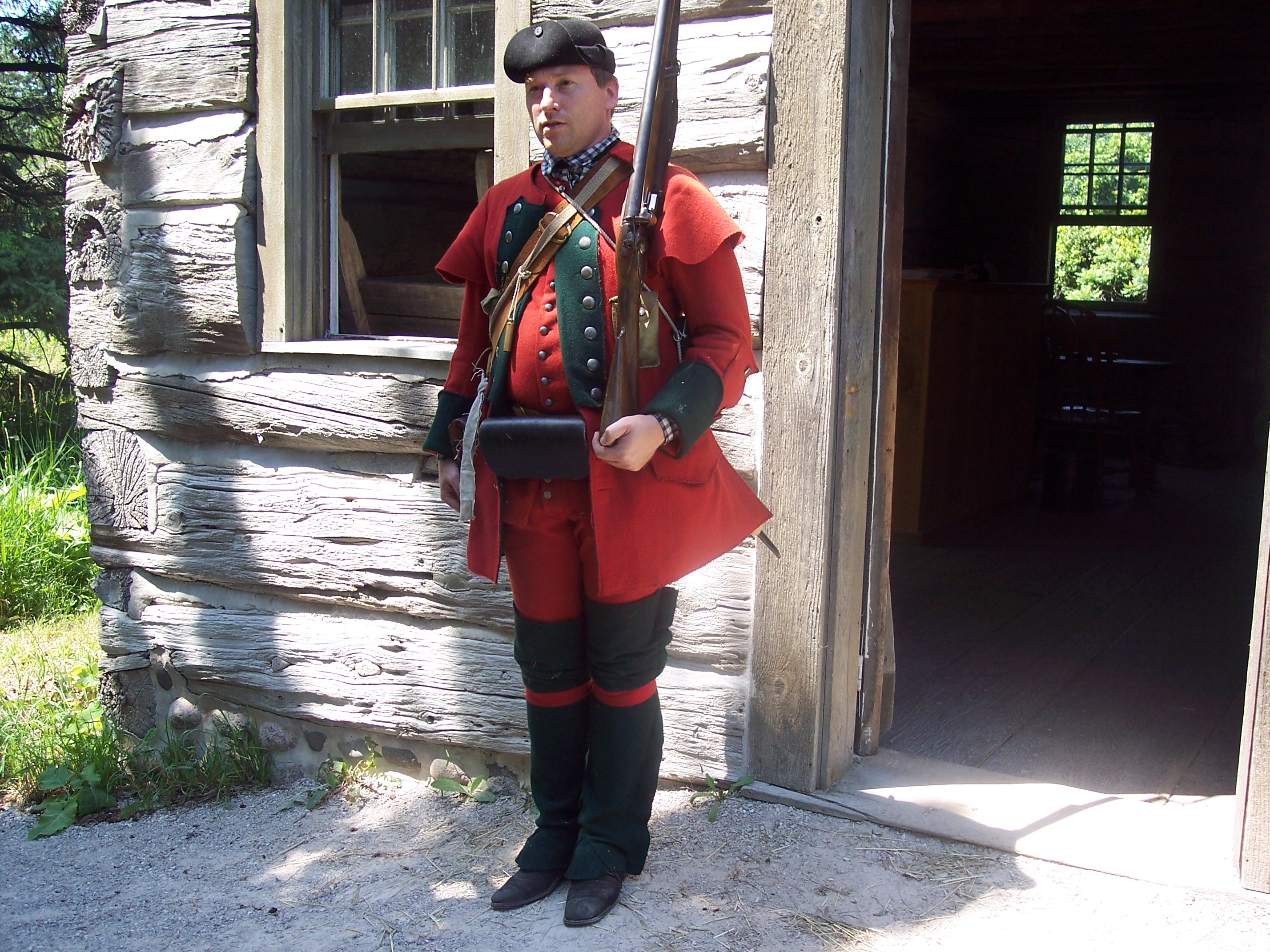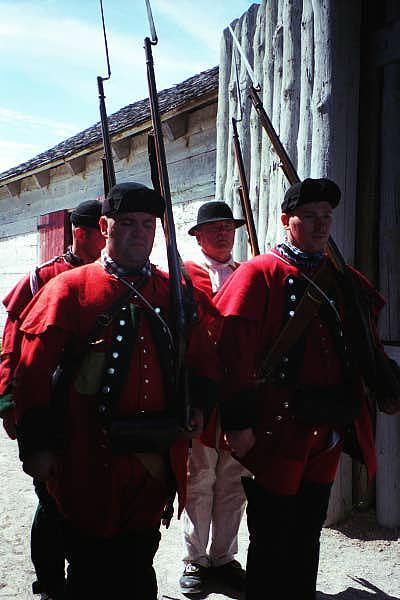Guard Duty
“the Corpls will post their centrys."
-Halkett Order Book

Just as it was necessary for soldiers to serve on guard duty, we do so as well. Our unit volunteers at events to help provide guards or centries. This provides us with another chance to get the feel of the daily life of the soldiers. Guard duty also serves as a good opportunity to interact with the public. Guard shifts are usually not very long, and sooner than you know it you are being relieved.
At times we provide guards for the encampment. At events such as garrisoning a fort, we post guards at the gates, bastions, and cat-walks. We may even provide the personal guard to high ranking officers. When we set up an out-guard camp, we frequently place advanced centries at various times of the day.
Standing Orders for the Guards of Garrisons and Camps.
When the troops to mount Guard, they are always to carry their blanket and provisions with them. No man is to have leave to return to his camp from the guard. The men are to be dressed neat and clean. Their arms are to be clean and in good order. The guards are to load with a running ball, that there may be no waste of ammunition.
When the Officer of the old guard hears or sees the new guard near, he is to order his men to stand to their arms; when they come in sight, they are to shoulder; and, when they come very near, the Officer of the old guard to order his men to rest their firelocks. The relieving Officer to draw up his men opposite to the old guard, and in the same order, either three deep, or in a rank intire: when he has made his guard rest, the Officers advance towards one another, paying the compliment of the hat; and the Officer of the old guard tells him what number of centries are posted, their orders, &c. &c. and delivers him a report of the guard with all orders, &c. The Serjeant of the old guard, at the same time, delivers his orders to that of the new guard; after which both guards shoulder, and the corporals of the new guard number off their men, and draw out their number of centries to be posted. The Serjeants of each guard to see that the guard-room, and utensils in charge of the guard, are clean and in good order. If any thing about the guard-room is broke or lost, or any thing under charge of the guard broke or spoiled, it is immediately to be reported. The relieving Officer is to examine every thing he is charged with, particularly prisoners, who are always to be seen. As soon as the old guard marches off, the new guard is to be drawn up on the ground vacated by the old guard, and the Serjeant is to make a roll of the guard, with the names and numbers of the men, distinguishing their regiments.
If the Commandant or any person intitled to compliments, should pass by the guard, during relief, the oldest Officer is to give the word of command to both guards. All guard to turn out to the Commandant, as often as he passes; only to pay him the compliment due to his rank in the army, viz. rested arms and one ruffle. Other officers, the first time with rested arms; always after, with shouldered arms.
The centries to be relieved every __________. The men of every relief to be seen and examined by the Officer or Serjeant of the guard, that they are sober and fit for duty; the corporal of every relief and patrole to report, when he returns to the guard, how he found every thing. No centry is ever to sit down on his post, or quit his arms, whistle, sing, or smoke tobacco, &c. and to allow no noise or riot near his post. The men to be acquainted if any of them when on centry, are seen to sit down they will be most sure to be punished, and if a Serjeant or corporal observes a soldier neglecting any part of his duty whilst on centry and does not take notice of it, may depend upon being instantly broke. All centries to rest to the Officers of the garrison. The centries when they rest to the officers are to begin their motions before the Officer comes too close upon them, that they may do it in just time and not to be hurried as is too often the case. The corporals on guard are always to acquaint the centries of this that they may not plead ignorance. In the night, rest to all rounds, patroles, and parties with arms; all centries to challenge, after it is dark. All centries, except those at the guard-room doors, when they challenge, and are answered, Rounds or Patroles, are to reply, ---Pass, Rounds or Patroles. If a centry, rounds, or patroles, should discover any body of troops from the ramparts, or any noise like that of an enemy approaching, the guard must be got under arms. No carriages are ever to be allowed to stop in the gate-way. In case of an alarm, or any thing considerable in the garrison, the guards are all to be kept under arms.

Taken from:
Journal of John Knox Vols. I & II.
The Moneypenny Orderly Book.
The Orderly Book of Capt. Stewart, Royal Highland Regiment
General Orders 1757.
Commissary Wilson’s Orderly Book.
Hawks Orderly Book.